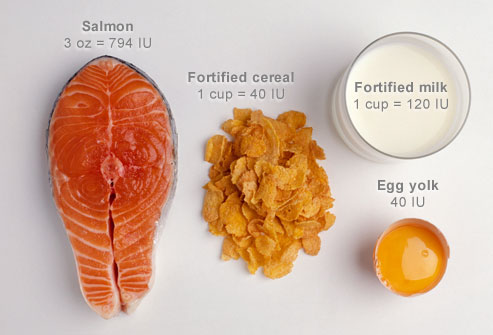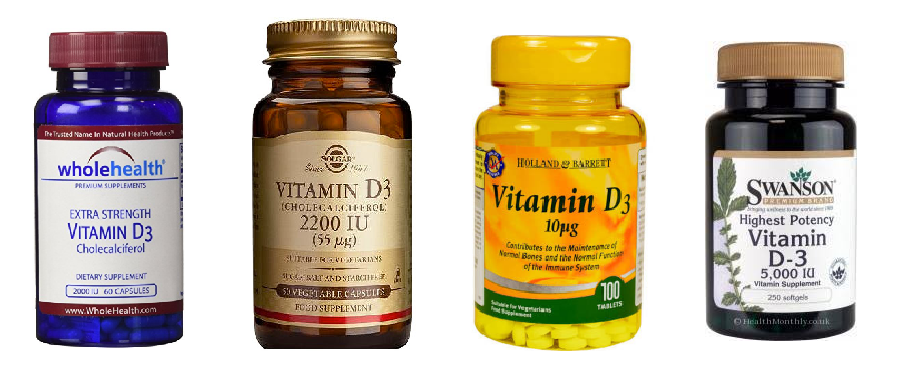
What is Vitamin D?
Commonly called “The Sunshine Vitamin”, Vitamin D is something your body can produce from exposure to sunlight.
It helps your body to use calcium in order to build strong bones. Vitamin D is also responsible for supporting your immune system.
It’s estimated that 1 in 33 cases of the common cold would be prevented in the UK if everyone supplemented with Vitamin D.
Vitamin D has also been shown to improve mood, reduce the risk of heart disease and help with certain cancers.
What foods contain Vitamin D?
The Recommended Dietary Allowance of Vitamin D for adults is 600 IU (15µg). In some cases this can be obtained from sunlight, but in winter months it needs to come from your diet.
Foods high in Vitamin D include:
- Egg yolks
- Cheese
- Foods “Fortified” with Vitamin D – commonly breakfast cereals and milk
- Fatty Fish – Salmon and Mackerel
- Mushrooms (due to sun exposure during growth)

As you can see from the image, other than a daily dose of salmon it can be hard to meet the nutritional requirements from food alone. The UK health service recommends Vitamin D supplementation for everyone over the age of 1.
What are the signs of Vitamin D deficiency?
It’s important to evaluate how likely it is that you are deficient. If you spend all your time indoors, or your climate doesn’t offer much sunshine in the winter months, then you are probably not getting the sun exposure you need. Based on data from the UK population, 1 in 5 people have a true deficiency, while 3 in 5 are said to have insufficient levels.
If you aren’t eating many of the foods above, that increases your likelihood of a deficiency.
Signs that could indicate Low Vitamin D:
- Bone or muscle weakness
- Regular stress fractures
- Constant tiredness
- Bodily aches and pains
- A persistent low mood
- Lack of energy
Remember that these symptoms are no guarantee of low Vitamin D as it can be due to other causes. The best way to confirm your Vitamin D levels if through a blood test.
Treatment for Vitamin D deficiency
Beyond ensuring you increase your sun exposure, and eating more foods that are rich in Vitamin D, there is the option of supplementation.
Initial estimates of Vitamin D IU (international units) per day have been revised, and around 2000IU a day is now recommended by some medical professionals.
If you are going the natural route and want to increase your sun exposure, remember that how much you absorb depends on several factors:
- Sun cream – While good for blocking harmful UVA and UVB rays, a high factor sun cream will reduce the absorption of Vitamin D
- Pollution – Living in a city with high pollution means the particles in the air will block some of the sun’s natural rays
- Shade – Another problem with built up areas is that the buildings will block the sunlight, so while you might be outdoors you will need direct sunlight
- Darker Skin – If you have darker skin, you are at a greater risk of Vitamin D deficiency
Personally I supplement with 2000IU around the winter months in the UK (September-March), as cloud cover limits the opportunity for sun exposure.
If you have a smaller frame, taking a 1000IU or 600IU tablet could be a starting point.
Vitamin D side effects
It’s important to consult your GP before taking Vitamin D supplements, as it can interact with some commonly prescribed medications.
Those who take a higher dose have reported stomach problems including diarrhoea and vomiting. Other side effects include muscle weakness, confusion and a lack of appetite.
Many supplements have side effects if taken in too high a dose. However, it’s important to speak to your doctor if you experience any negative effects from taking Vitamin D.


